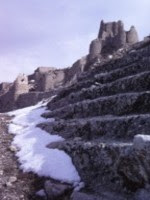A State of Injustice

The following article was written by Mizgin Yilmaz, proprietor of Rasti. Mizgin virtually always writes in a state of high dudgeon, and she is virtually always justified in doing so. Such is the case this time. Note: be sure to check out the links she has posted. They are highly instructive. Again, this is a state which expects to be part of the European Union.
[TSK is the Turkish Armed Forces. OHAL refers to the emergency martial-law regime in the Kurdish southeast of Turkey.]
Cross-posted at The Pasha and The Gypsy and Progressive Historians.
THE STATE OF INJUSTICE
"A kingdom founded on injustice never lasts."
~ Lucius Annaeus Seneca.
Picture this: A seventeen-year-old guy picks up his seventeen-year-old girlfriend after school and takes her to his family's large home. The guy kills the girl, decapitates her with a saw and chops up her body, stuffs the body parts into a suitcase and guitar case, gets a driver to take him to a dumpster on the other side of town and disposes of the body.
The guy's father is picked up by the police on charges of abetting the crime and the mother flees the country.
Six months after the murder, the guy turns himself in to the police.
What do you think should happen to a guy like this? Would it make any difference if you knew that the murderer was a member of one of the richest families in the country?
If this story plays out in Turkey, which it did, the murderer will be charged in juvenile court--because he's only seventeen--instead of being tried as an adult.
More on the murder at Zaman and another at Bianet. Note that the first of those articles claims the father of the murdered girl is quoted as thanking the police and government for helping to capture the murderer. However, that's not at all the same guy who was on NTV on the day of the surrender, yelling to know what kind of deal had been made between the government and the very rich kid's family.
On the other hand, if you're a ten-year-old kid growing up in another part of the country, in a family that was probably forcibly displaced from their home back in the 1990s, and you're a Kurd, you're going to get very different treatment from the state:In Adana alone, some 155 children are facing trial, 67 have been convicted and five have begun to serve their sentences, says Ethem Acikalin, head of the local branch of Turkey’s Human Rights Association. All were charged under article 220/6 of the penal code, which criminalises “acting on behalf of a terrorist organisation”. The cases are tried in adult courts.
Or then there was Cizre:If Turkish prosecutors have their way, Yilmaz, a soft-spoken 16-year-old with a teenager’s pimply face, could spend up to seven years in jail for having joined a demonstration early last year in the town of Cizre, in Turkey’s predominantly Kurdish southeast.
Yilmaz (the name has been changed to protect his identity) has already spent 13 months in jail awaiting trial, although he was recently let out on bail. Although he joined a demonstration that took place after the funeral of a young boy who had been run over by a police armored vehicle during an earlier protest, prosecutors say the event was organized by the outlawed Kurdistan Workers’ Party (PKK) and are charging the boy with supporting a terrorist organization.
"In each appearance in court, we were telling the prosecutors that we are children, that they should let us go back to our lives," says Yilmaz.
Yilmaz is one of hundreds of minors, some as young as 13, who have been arrested and jailed in Turkey over the last few years under strict new anti-terrorism laws that allow for juveniles to be tried as adults. Some have even been accused of "committing crimes in the name of a terrorist organization" for participating in demonstrations that prosecutors charge have been organized the PKK.
If you're the police and you torture a Kurdish kid in broad daylight, in front of media cameras, then have no fear! Your case will be dropped.
Then there are the activities of the ironically-named "Children's Day" in Hakkari.
Or, as happened several days ago, if you're a fourteen-year-old Kurdish girl gathering feed for her sheep, you can just be blown to bits by TSK mortar fire. At least Ceylan's mother was able to pick
up the pieces of her daughter that were left so that they could be buried. The cover-up is already ongoing because no prosecutor arrived at the scene of the crime and he cites "security zone" (i.e. OHAL) as the reason for helping TSK to cover up its murder of this Kurdish child.



